Dental implants have revolutionized the way we address missing teeth. They offer a permanent solution that mimics the look and function of natural teeth. However, just like natural teeth, implants require diligent care to ensure their longevity. Proper oral hygiene is crucial for preventing complications that could compromise the implant’s success.

Understand the Importance of Daily Care
Daily oral hygiene routines are the cornerstone of implant maintenance. Plaque and bacteria can accumulate around the implant site. This buildup can lead to peri-implantitis, a serious infection affecting the gum and bone around the implant. Such infections can cause implant failure if not addressed promptly. Consistent cleaning routines help prevent these issues. They also contribute to overall oral health, which is essential for implant longevity. Establishing a routine that includes brushing and flossing helps maintain a healthy environment for your implant.
Choose the Right Toothbrush
Selecting the appropriate toothbrush is vital for effective cleaning. A soft-bristled toothbrush is recommended to avoid damaging the gum tissue around the implant. Hard bristles can cause gum recession, exposing the implant and increasing the risk of infection. Electric toothbrushes offer an advantage with their oscillating motion, which can remove plaque more effectively than manual brushing. Ensure you brush twice daily, spending at least two minutes each time. Pay special attention to the gum line and the area around the implant. Replace your toothbrush every three months or sooner if the bristles become frayed.
Floss Regularly
Flossing is an essential part of oral hygiene, especially for implant maintenance. It removes food particles and plaque from between the teeth and around the implant. Traditional floss can be challenging to use around implants. Consider using an implant-specific floss or an interdental brush. These tools are designed to clean the hard-to-reach areas that a regular toothbrush might miss. Flossing at least once a day can significantly reduce the risk of peri-implantitis. Proper technique is important; ensure you curve the floss around the tooth and gently slide it under the gumline.
Consider Antimicrobial Mouthwash
Incorporating an antimicrobial mouthwash into your routine can provide additional protection against bacteria. These mouthwashes help reduce the bacterial load in the mouth, which is crucial for preventing infections around the implant. Use mouthwash as directed by your dentist, typically once or twice a day. However, it’s important to remember that mouthwash should complement, not replace, brushing and flossing. Choose a mouthwash that is alcohol-free to avoid drying out your mouth, which can exacerbate other oral health issues.
Visit Your Dentist Regularly
Regular dental check-ups are a critical component of implant care. These visits allow your dentist to monitor the health of your implant and surrounding tissues. Professional cleanings remove plaque and tartar that regular brushing and flossing might miss. Your dentist can also evaluate the fit and function of the implant, ensuring everything is in order. Routine visits provide an opportunity to discuss any concerns or changes in your oral health. Schedule appointments every six months, or more frequently if your dentist recommends it.
Avoid Hard and Sticky Foods
Diet plays a significant role in the maintenance of dental implants. Hard foods, such as nuts and hard candies, can exert excessive pressure on the implant. This pressure can lead to cracks or fractures. Sticky foods like caramel can adhere to the implant and promote plaque buildup. These foods can also cause the crown to loosen. Opt for softer foods that are easier to chew. Chewing on both sides of your mouth can distribute pressure evenly, reducing the risk of damage.
Monitor Changes in Your Mouth
Being vigilant about changes in your mouth is important for early detection of potential issues. Pay attention to any redness, swelling, or discomfort around the implant site. These symptoms could indicate an infection or other problem. Report any changes to your dentist promptly. Early intervention could prevent more serious complications and ensure the longevity of your implant. Regular self-examinations can help you identify issues before they become significant problems.
Dental Implants in Plano, TX
At Advanced Implant and Oral Surgery, we offer comprehensive dental care. Our team works hard to ensure all your oral health needs are met with expertise and care. Contact our office today to schedule a consultation and learn more about how you can maintain your dental implants.
